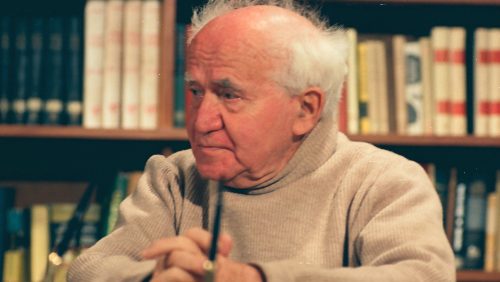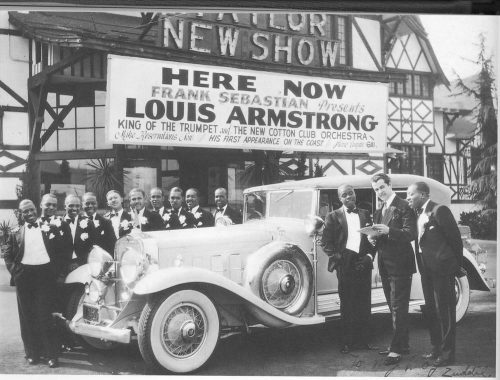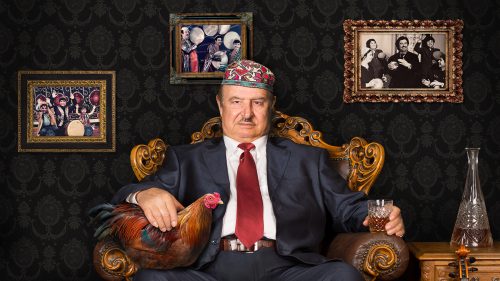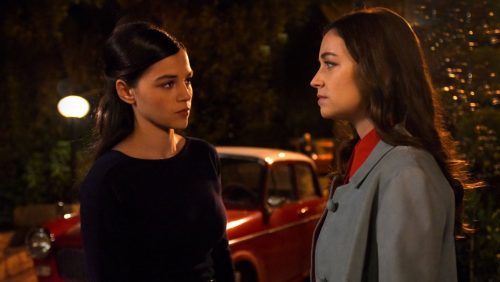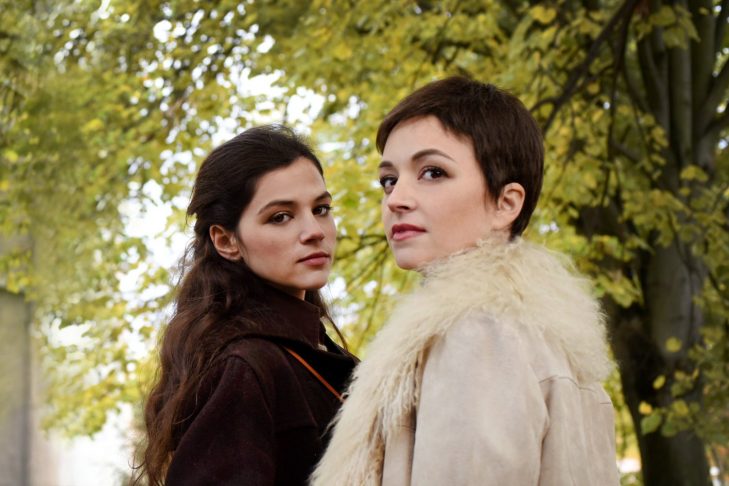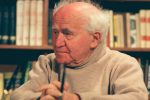Since its founding in 1976, the National Center for Jewish Film (NCJF) has spearheaded the revival of Yiddish film, and in recent years has also served as a remarkable clearinghouse for modern Jewish cinema. Now in its 20th year, NCJF’s annual festival has consistently featured an impressive lineup of Jewish-themed films, and this year is no exception. A mix of movies and documentaries come to Boston from Israel, Russia, Germany and the United States.
The festival opens Thursday, May 4, with writer and director Yariv Mozer’s documentary, “Ben-Gurion: Epilogue.” Mozer distills a six-hour interview with Israel’s founding father that took place in 1968 when he was a spry 82 years old. David Ben-Gurion and his interlocutor talk in the former prime minister’s book-lined study in Sde Boker, the kibbutz to which Ben-Gurion retired in Israel’s Negev desert.
Mozer effectively intersperses the interview with archival footage of Israel’s founding, the Six-Day War and Ben-Gurion addressing a session of the Knesset with Golda Meir and Moshe Dayan in the audience. There’s also the personal here, with Ben-Gurion sharing a piano bench with Ray Charles and playfully doing a headstand on the beach. Perhaps the most surprising takeaway is that Ben-Gurion, one of history’s most famous Zionists, eschews that description of himself. The interview, which is conducted in English, presents a thoughtful, even dovish, Ben-Gurion, who is willing to cede land for peace. In the wake of the Six-Day War, he warns Israel’s leaders: “You are not considering the future. You are only considering the present.” One of the commentators in the documentary “Body and Soul: An American Bridge” asserts that every musical encounter is a cross-cultural one. Perhaps no relationship has illustrated this phenomenon more clearly than the musical kinship between African-Americans and Jews. Filmmaker Robert Phillipson’s in-depth examination of the 1930s tune “Body and Soul,” written by Jewish songwriter Johnny Green and introduced on Broadway by Libby Holman, a Jewish chanteuse, represents the heart of the African-American-Jewish musical alliance. Benny Goodman made the song his own in 1935, collaborating with African-American piano player Teddy Wilson. It was one of the earliest successes in the story of American integration. But it was Louis Armstrong who made “Body and Soul” a classic in the African-American jazz canon. The documentary is also a poignant reminder that jazz was a melding of Scott Joplin’s ragtime rhythms and the minor notes of klezmer music. ”Hummus! The Movie” is a delectable foray into the world of preparing and serving hummus. The documentary follows the fortunes of five restaurateurs and one Benedictine monk, all in search of the perfect hummus. Jalil Dabit, owner of Hummus Samir in Ramla, is a Christian Arab who settled in Berlin to be with his girlfriend. He launched a Middle Eastern restaurant there with an Israeli business partner and ends up dividing his time between his restaurants in Ramla and Berlin. Eliyahu is a tattooed, dreadlocked drifter turned Hasidic Jew who finds himself at the helm of a successful chain of kosher hummus restaurants. And Olivier, the monk who lives in Abu Gosh, the self-proclaimed Israeli capitol of hummus, is in search of the perfect hummus. But the heart of the film belongs to Suheila al-Hindi, a Muslim woman on her own who makes award-winning hummus at her restaurant, Abu Suheil, in Acre. Director Oren Rosenfeld has assembled a quirky, loveable ensemble cast that demonstrates how food can bring together disparate groups of people. The complexity of family is drawn out in the high-energy documentary “The Wonderful Kingdom of Papa Alaev.” The eponymous Papa of the title is an irascible octogenarian who heads a multigenerational family of musical performers. The Alaevs brought their musical act to Israel when they immigrated from Tajikistan in 1991 after the dissolution of the Soviet Union. Filmmakers Tal Barda and Noam Pinchas make it clear that Papa is a patriarch with an iron will. His oldest daughter, Ada, is frustrated with her father’s sexism. A talented musician who plays a zither-like instrument called the qunun, she says growing up with him “is to be in a marathon of achievement and music always.” Oldest son Ariel accepts his father’s mantle and keeps the act going under Papa’s watchful eye. But Papa’s Israeli grandchildren mystify him. Ariel’s son’s Orthodoxy puts him at odds with the family when he refuses to practice or perform on Shabbat. Ada’s son, Zvika, forges his own musical path by playing with other groups. It’s a sweet moment at the end of the film when he and Ada play together. It’s not exactly a reunion with her family, but Ada happily has her musical moment with her son. Astrology aficionados will recognize the term “moon in the 12th house,” which often describes a person who frequently shuns contact with the world and retreats to a peaceful, healing setting. It’s an apt description of 21-year-old Lenny’s life. Lenny has retreated to her family’s rural home to care for her widowed father, who has had a stroke, and to look after the attractive teenage boy across the street. Older sister Mira works at a Tel Aviv nightclub owned by her gangster boyfriend. When Mira discovers she’s pregnant, she goes back to the home she fled years earlier. The two sisters, who were once close, have drifted apart. But their unplanned reunion forces them to face a traumatic past with a cruel stepmother. “Moon in the 12th House” is an anomaly for an Israeli film. In a region drenched in divisive politics and a history complicated by memory, this engaging movie explores the unbreakable bond of these two sisters. Another pair of sisters play detective to investigate their Holocaust survivor father’s past and are the focus of Avi Nesher’s suspenseful film. Set in 1977, “Past Life” opens in West Berlin as the younger sister, Sephi, sings a solo with her visiting Israeli choir. At a reception after the show, Sephi and her sister, Nana, are accosted by an elderly Polish woman who shouts that their father was a murderer during World War II. It’s a startling scene as she’s taken away by her son, Thomas, a Polish-German composer. Back in Tel Aviv, Nana, a journalist with fiery liberal politics, is determined to find the truth to confront her father, Dr. Baruch Milch. Baruch, a practicing gynecologist, is a stern man—a man who bullied his daughters throughout their childhood. Sephi, who also composes choral music, prefers not to stir up painful memories for her father. Baruch eventually relents and describes the desperate months he hid from the Nazis in the cellar of his Polish neighbors. But his account brings up more questions than it answers. The sisters pursue their investigation until the story unravels as Sephi returns to West Berlin, this time to debut her Holocaust-inspired choral composition. “Past Life” is based on the actual wartime diaries of Dr. Baruch Milch. His oldest daughter, who inspired the Nana character, rendered his story in a book called “Can Heaven Be Void?” Like Sephi, his younger daughter is a composer whose pieces are featured throughout the film. Writer and director Avi Nesher has added complex layers to Milch’s original story, including a not-so-subtle reference to Anwar Sadat’s historical visit to Israel, where he too broke away from a painful history to pursue a new path. Find the schedule of NCJF festival screenings here.
Related
